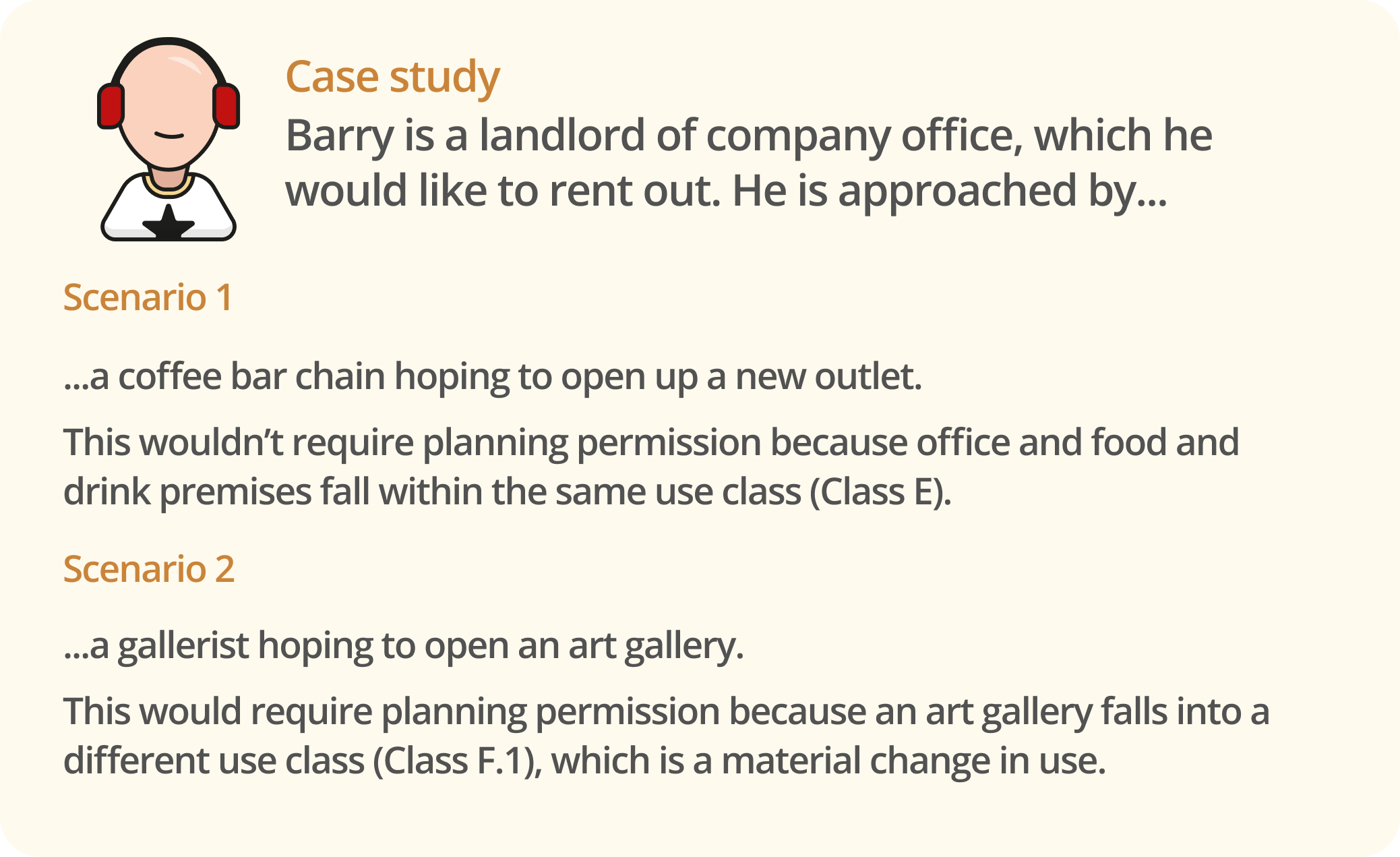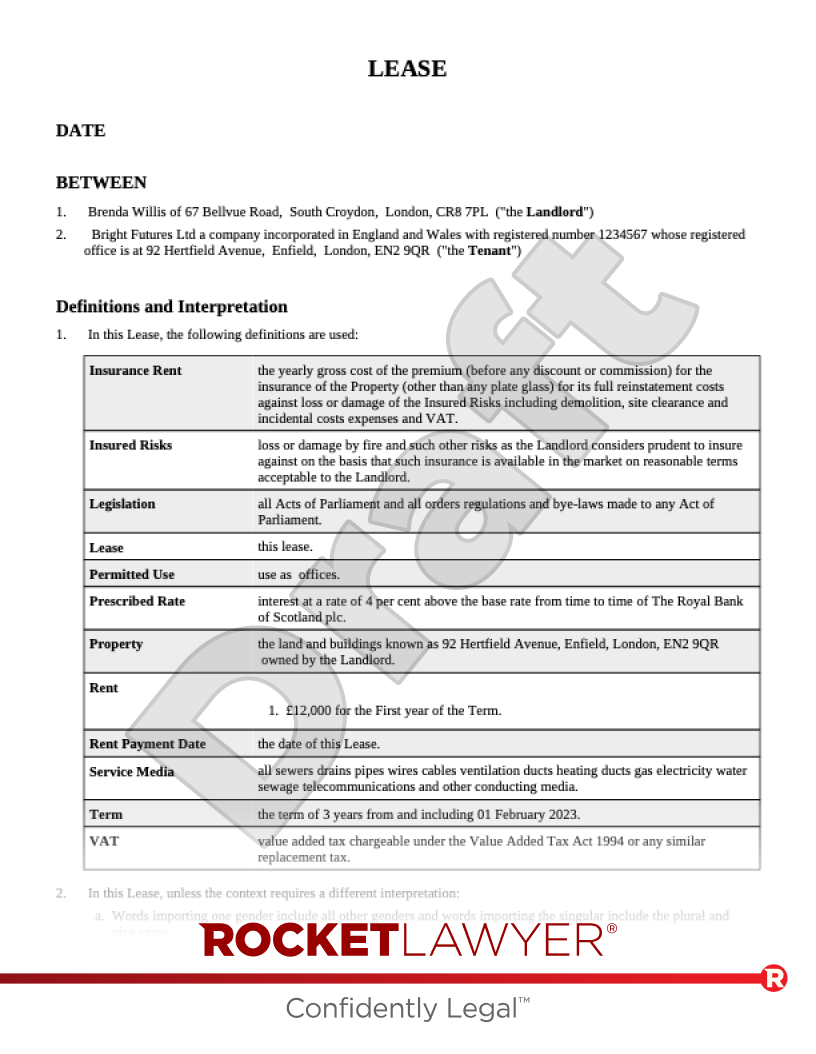What are use classes?

A use class determines how property – such as commercial premises – can legally be used. The specific use classes available across the UK differ depending on where a property is located.
England
Under The Town and Country Planning (Use Classes) Order 1987, buildings and plots of land are categorised into various 'use classes'. Examples under the use classes order include:
-
Class E – commercial, business and service, including use for:
-
shops
-
financial and professional services
-
food and drink (mainly on the premises)
-
non-intrusive business functions (eg office operations, research and development, and light industrial processes)
-
non-residential medical or health services, crèches, and day nurseries and centres
-
assembly and leisure establishments (eg indoor sport, recreation or fitness, and gym facilities)
-
Class F.1 – learning and non-residential institutions (eg those for education, art galleries, museums, public libraries, public exhibition halls, places of worship, and law courts)
-
Class F.2 – local community
-
shops no larger than 280sqm selling mostly essential goods and at least 1km from another similar shop, community halls, outdoor sport and recreation areas, indoor or outdoor swimming pools, or skating rinks
-
-
Class C3 – residential houses
-
sui generis – uses that fall outside the limits of the other defined use classes, for example:
-
public houses, wine bars, and drinking establishments
-
hot food takeaway premises
-
cinemas, concert halls, bingo halls, and dance halls
For more information, read the Planning Portal’s guidance on use classes.
Wales
In Wales, The Town and Country Planning (Use Classes) Order 1987 (as amended) puts uses of land and buildings into various categories. These use classes include:
-
Class A1– shops
-
Class A3 – food and drink
-
Class B1 – business (eg some offices, research and development functions, and light industrial functions)
-
Class B2 – general industrial
-
Class C1 – hotels
-
Class C3 – residential houses
-
Class D2 – assembly and leisure establishments (eg concert halls)
For more information, see the Planning Portal’s guidance on use classes in Wales.
Scotland
In Scotland, The Town and Country Planning (Use Classes) Scotland Order 1997 is the relevant legislation and the terminology used is slightly different. Examples of use classes include:
-
Class 1 – shops
-
Class 2 – financial and professional services
-
Class 3 – food and drink
-
Class 4 – business
-
Class 5 – general industry
-
Class 6 – storage or distribution
-
Class 9 – houses
Uses that don’t fall within a specific class under the legislation are referred to as ‘sui generis’.
When does changing use classes require planning permission?
Once a use class has been assigned, only the types of businesses whose functions that fall within that particular use class can operate on the premises.
If a new business occupies the property and falls within the same use class, there is no need to seek planning permission (for the purposes of use classes).
Before a new type of business is allowed to operate on the premises, the use class must be changed if the change in use constitutes a ‘material change in use’ of the land or building. A change of use may be considered material if its impact on the use of the land and buildings is significant.
Changing use class generally involves obtaining planning permission.

The Town and Country Planning (General Permitted Development) (England) Order 2015 (the GPDO) enabled certain use classes to be switched without seeking planning permission. In Scotland, The Town and Country Planning (General Permitted Development) (Scotland) Order 1992 (as amended) did the same.
In England, Class MA allows for the change of use from commercial business and service use (Class E) to residential use (Class C3) via prior approval from the local planning authority, when certain restrictions are complied with (eg the building having been in commercial, business, or service use for two years prior).
Can I change how business uses premises it rents?
Businesses renting a property will usually find restrictions in the lease relating to use classes and the associated permitted use of the premises.
Restrictions under the lease may be different to (eg additional to) those imposed by use classes (especially since use classes change over time), so businesses should understand both their obligations under the lease and under the local planning law.
Though a new permitted use can be negotiated with a landlord, it may also require planning permission. Additionally, where a tenant has requested to change the permitted use and the change requires planning permission to change the use class, the landlord has the right to require payment from the tenant as a condition of their consent to cover any costs incurred in connection with changing the permitted use.
Is changing use classes affected by building regulations?
Where permission has been granted to change a use class, this could involve making physical changes to the building through building work. This building work might also require building regulation approval and compliance, on top of the permission to change use classes.
Sometimes even minor alterations (eg changing ventilation systems) may be considered 'building work' – so it's important to check if any changes being made to premises are covered by the building regulations in England and Wales or those in Scotland.
Will I need to get a licence to operate on commercial premises?
To carry out certain types of activity on a premise will additionally require a licence (separate to use classes). Examples include:
-
serving alcohol
-
hosting live music
-
showing a film
For more information on licensing, read Business licences.




